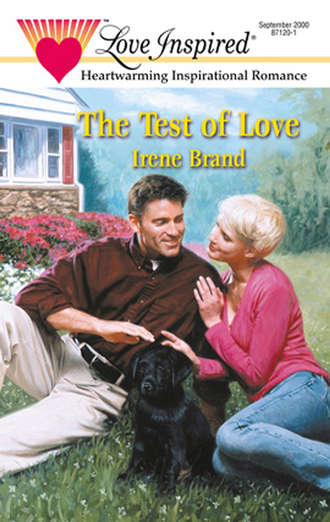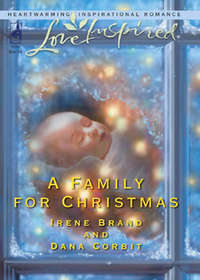
Полная версия
The Test of Love
But she hadn’t come here to think about Joseph. Ray was her main concern now. Did she love him? At one time, she’d had no doubt. Did her love die, or had she ever truly loved him? Connie had no desire to marry Ray now. She couldn’t imagine spending the rest of her life with a man who used force to achieve his objectives. But should he continue in the employ of NLC? Ray was an expert in his field, and he would be hard to replace.
When she left the chapel, Connie hadn’t gotten the answers she’d come to find.
Connie awoke to bright sunshine and the sound of a white-winged dove cooing outside her window. She threw back the covers and hit the floor with a song bursting from her lips. She couldn’t match the dove’s refrain, but she had a melody of her own.
Kim’s bed was neatly made, and the apartment was empty. Kim had already gone for her early-morning swim.
Changing into sweats, and feeling a tremendous joy in the new day, Connie joined Peggy on the two-mile round-trip run they took every morning. Joseph would be coming to the Center today, and she fleetingly wondered if that was the reason for her joyful attitude. Of course it was, for she always looked forward to helping a new patient—her excitement didn’t have anything to do with the captivating masculinity that, in spite of his disability, Joseph radiated.
Connie waited in her office, and when Joseph didn’t telephone, she wondered if he’d decided not to come, but she soon heard his halting tread in the corridor. Kim greeted him warmly, and said, “Connie is in her office. Go on in.”
Joseph paused with his hand on the doorknob, feeling giddy at the thought of seeing Connie again. She’d been uppermost in his thoughts for two days, and he blushed when he remembered that her presence had even infiltrated his dreams. Banishing such thoughts from his mind, he entered the room and closed the door behind him.
Joseph was dressed in jeans and a red-plaid flannel shirt that lent color to his face, which had grown pale during his hospital confinement. During previous television interviews, Joseph had always appeared as a tanned and hardy outdoorsman, and his casual appearance today pleased Connie.
After they were seated, he said, with some apprehension and a hint of belligerence, “Well, was I accepted or not?”
“Yes. We’re willing to give it a try if you are.”
“The sooner the better,” he muttered. “My leg has been giving me fits this morning. I brought my luggage.”
With a gleam in her eyes, she said, “You were unfortunate enough to draw me for your personal trainer. We rotate assignments based on workload, and since we discharged one of my patients last week, I was next in line for an assignment. After a week, if we aren’t compatible, you can have another trainer.”
“Why wouldn’t we be?”
Considering her sensitivity to Joseph’s physical appeal, Connie knew very well why it might be necessary to appoint a different trainer for him, but she said evenly, “It doesn’t happen often, but we’ve had a few cases of personality conflicts, and when that happens, the patient is given the option to have another trainer.”
“I’m sure we’ll get along all right,” Joseph said with a grin. “I’m peaceable until the pain gets too bad.”
Connie picked up a folder from her desk. “Let’s sit at the conference table,” she said, indicating an oval table near the window. Joseph pulled out a chair, seated Connie, then took the chair beside her. She spread out several sheets of paper.
“I’ve planned a three-month program for you.”
“You still think it will take that long?”
“Probably. We’ll start slowly and gradually work up to your potential. I want you to walk out of here at the end of three months as physically fit as you were when I saw you ride a bucking bronco at the state fair two years ago.”
“You saw that, did you?” His gray eyes flashed with pleasure.
“On television—but it impressed me.”
“Bronc riding is a hobby for me, and most of my riding has been local. I thought my rodeo days were over, but I’m beginning to hope again. Dr. Melrose said that NLC would have that effect on me.”
“We’ll make every effort. Today, we’ll settle you into a dorm room and do a few exercises.” She handed him several sheets of paper. “Tomorrow, we’ll start on this schedule, and then add a little more distance and additional exercises each day.”
He glanced through the papers. “Looks as if I’ll be busy enough.”
“Our residents work at their own speed. Some are up at the break of dawn, swimming, jogging or working out in the gym. The day’s schedule for everyone begins with worship services at half-past seven, and breakfast at eight. I always go jogging and shower before chapel, but until you’re stronger, you should wait until after breakfast to start your physical activity. Other meals are at noon and six o’clock in the evening. Three meals a day and chapel are mandatory. Otherwise, it’s up to the trainer and the client to decide on the individual’s program.”
“Do you actually believe that Christian worship makes a difference in the healing process?”
“Absolutely! It’s been proven that people with a strong, practicing faith heal faster than those who don’t believe in God.”
“I’ve read those reports, but the people who heal more rapidly are those suffering from depression, hypertension, heart disease and similar problems—not anyone with an injury like mine.”
“You’re right to a degree, but one medical school study found that deeply religious surgical patients are less likely to die than those who find no comfort in religion.”
“I don’t believe it, but at this point, I’m desperate enough to try anything. I’ll attend chapel.”
“Even if you don’t achieve complete healing, if your spirit is freed, you won’t mind the physical injury so much.”
Connie didn’t think she’d convinced him, but Joseph glanced through the papers. “So my goal for the first week is to walk a mile and back, starting at nine o’clock each morning.”
“Yes. The first days, you won’t be able to walk that far, but hopefully you’ll be able to by the end of the week. After the walk, you should rest in your room, and then spend an hour in the pool before lunch. In the afternoon, you can work in the gym at your own speed.”
“I notice you don’t have anything scheduled for evenings. Is that time reserved so the patient can take his trainer out for dinner?” Joseph hoped his expression didn’t reveal his consternation. What had prompted him to make such a suggestion?
Startled, Connie swung a quick look in his direction, and their gazes locked for a few tense seconds. Connie deliberately ignored his remark and stacked the papers in front of her in an effort to regain her composure.
“A masseur and a masseuse come from Denver each evening, and many clients find it beneficial to have a massage several times a week. There are support group sessions where patients talk over the problems they’re having. We show movies each night—nothing but comedies because laughter, too, is a part of the healing process. Or evening can be a good time to enjoy the peace and solitude of our surroundings. I’m proud of the grounds here at NLC—they’re especially lovely in the spring.”
“The lake near the gate is beautiful,” Joseph drawled, chastened by her silent reprimand. Well, he’d asked for it. His remark was out of line.
“There are benches around the lake,” Connie continued, and he couldn’t tell from her voice if she was annoyed with him, “and many of our clients find it restful to sit and watch the ducks. The lake is stocked with fish, too, if you’re interested in fishing.”
“I’ve done a lot of trout fishing, but I prefer to do that in a mountain current.” His face hardened and his gray eyes dulled, and Connie suspected Joseph wondered how he could ever stand again in a cold mountain stream when he couldn’t even walk unaided.
Connie joined Joseph in his blue pickup, and they drove to the dorm. “I arranged for you to sleep on the second floor because climbing stairs will be beneficial to you. However, there’s an elevator to use when necessary. You must not overtax your strength! Most clients push themselves too much at first and become discouraged when they don’t see immediate results. In fact, strenuous exercise at first does more harm than good.”
The gardener was working in the flower beds in front of the dorm building, and he took the luggage upstairs by the elevator. Connie wanted to see Joseph’s performance on the stairs, but seeing the way he winced on each step, she wished she hadn’t asked him to try.
Joseph sat down immediately when they reached his room, and although his breath came in uneven gasps, he complimented Connie on the accommodations. The rooms varied in size, but she’d arranged for Joseph to have a large one with a king-size bed and a view of the mountains. A Bible on the night table lay open to a highlighted verse in the book of Isaiah. “Even youths grow tired and weary, and young men stumble and fall; but those who hope in the Lord will renew their strength. They will soar on wings like eagles; they will run and not grow weary, they will walk and not be faint.”
Paintings by local artists decorated the walls, and a large cross-stitched sampler facing the bed was embroidered with a Bible verse from I Corinthians. “Your body is a temple of the Holy Spirit, who is in you, whom you have received from God. You are not your own; you were bought at a price. Therefore, honor God with your body.”
Joseph glanced out the window. “This is a peaceful setting,” he said. “The large kitchen window in my house faces the mountains, too. It used to be a peaceful place.”
Did the death of his wife keep him from finding any pleasure in his home? It shouldn’t be surprising that Joseph would be depressed over the tragic events in his life during the past year. Had it been a happy marriage?
“What’s on the program for this afternoon?”
Connie had intended for him to take a short walk, but suddenly she was overwhelmed with the desire to know more about Joseph—not just as a patient of NLC, but as a person. Besides, she thought climbing the stairs had overtaxed his strength.
“Tomorrow morning will be soon enough to start your exercises, so I propose we go on a picnic to Paddy’s Point, NLC’s most scenic spot, this afternoon. It’s located along a graveled road that leads to our reservoir, and we can travel on the Center’s ATV. Or would you prefer to rest?”
“Not at all. I haven’t been on a picnic for years.”
“On second thought—with your injury, the ATV may be too rough for you.”
He grinned. “Not as long as you drive.”
“Take a half hour to rest, and I’ll check with Rose about our food.”
After Connie left, Joseph stretched out on the bed, but he didn’t sleep. Would his awareness of Connie as a desirable young woman interfere with his therapy sessions? He’d married Virginia for “better or worse,” and even when their marriage soured, his thoughts and actions had remained faithful. He didn’t take any pride in his restraint, for he hadn’t seen another woman who’d interested him until he met Connie.
Virginia had frequent mood swings. For months she might be sweet, vibrant, attentive, then suddenly she would become depressed and uncommunicative. Upon her parents’ insistence, she’d once been tested for being manic-depressive, but when the tests had proven negative, she’d discontinued her medication. His quiet wife had been a sharp contrast to Connie’s outgoing, vibrant personality, and he wondered if he’d have the strength to resist her when he was in her presence for three months. He had enough trouble without developing a romantic bent for Connie.
As long as suspicion of Virginia’s death shadowed him, he had to focus on his legal situation. When he regained his mobility, Joseph was determined to find out what had really happened in the days and weeks prior to his wife’s death. He remembered a Bible verse he’d learned as a youth. “The truth will set you free.” He’d never be free until he learned the truth about Virginia’s death.
Chapter Three
Wondering what had possessed her to make such a suggestion, Connie hurried toward the cafeteria. She’d never picnicked alone with another patient!
“Hi, Rose,” she called as she entered the kitchen. “Could you pack a lunch for me? Mr. Caldwell isn’t ready for exercise this afternoon, and I suggested taking him on a picnic at Paddy’s Point.”
Connie fidgeted while Rose rummaged in the cabinets and refrigerator. Was it too late to change her mind? Or did she have a mind where Joseph was concerned? Joseph was like no man she’d ever known, and her behavior was worse than a girl with her first teenage crush.
“Here you are,” Rose said, approaching with a small basket. “Cold grilled chicken breasts, tomatoes, apples, bread, yogurt and iced tea. Anything else?”
“No, that’s fine. I didn’t expect a feast on such an impromptu request.”
Connie hurried away before Rose could ask any questions. The ATV hadn’t been used for a couple of weeks, but the motor started on the first try, and Connie drove it out of the garage and stopped in front of the dorm. She fastened the basket on the rear of the vehicle.
Connie hurriedly went to the apartment to change into jeans, and Joseph was waiting by the vehicle when she returned.
“Are you sure you don’t want to drive?” she asked. “I’ve only operated this thing a few times.”
He shook his head. “We have an ATV at the ranch, and I can give you advice if you need it. I don’t want to risk hurting my leg by driving, but a four-wheeler isn’t much rougher than a truck. Drive slowly, and there won’t be any problem.”
Still with some hesitation, she held Joseph’s arm while he carefully and slowly lifted his left leg over the driver’s seat, perched over the rear wheels of the ATV, and stretched out his injured limb. Once he was settled, Connie sat on the padded seat behind the wheel. Joseph hardly knew what to do with his hands, but Connie said, “Put your arms around my waist. I’ll try to drive carefully, but you need to be able to steady yourself.”
Joseph did as she said, but not without misgiving. Had he suffered a momentary mental relapse to agree to this strenuous excursion? And what about the injury to his heart—a heart already bruised and vulnerable? But he gritted his teeth, determined to endure with composure any pain to his injured hip or any emotional stress incurred from physical nearness to Connie.
When she’d always advised her staff to avoid personal encounters with their patients, Connie was hard put to understand why she’d suggested this outing with Joseph. There wasn’t anything she could do now, but she vowed that this was just a one-time incident. Regardless of today’s outcome, she would know better in the future. With these thoughts, she salved her conscience as, mindful of Joseph’s injury, she put the vehicle slowly into motion. But her conscience didn’t have to deal, as Connie did, with Joseph’s soft breath on her neck, the firmness of his arms around her waist, nor the strength of his hands clasped in front of her.
Joseph needed NLC, but Connie didn’t need the frustrations his presence provoked, and she wondered how she could endure three months of daily interaction with him and retain a strict patient-therapist relationship. Did she have the strength to remain dispassionate to this man who’d captivated her thoughts since the first day she’d met him?
When they entered the forest behind the chapel, the trail curved steadily upward. Connie shifted into a lower gear and glanced over her shoulder.
“Okay?”
“Not a twinge so far. You’re a careful driver.”
“Paddy’s Point is only two miles on this trail, but it’s too far for you to walk,” she shouted, as she revved the motor and moved forward. The vehicle lurched into a small ditch, and Joseph’s chin bumped into Connie’s head.
“Sorry,” he said.
“Did that jolt your leg?” she yelled, for the noise of the engine was deafening.
“Don’t worry about me—I’m fine.”
They soon arrived at a scenic spot, where a few years earlier, a forest fire had destroyed the tall trees, making way for a new stand of aspens and pines. Several miles to the west, the mountains around Berthoud Pass lifted their majestic peaks skyward. A small table and two benches provided a resting place for patients who jogged along this path. They were hailed by a couple of teenagers from Lakewood, who came to NLC daily to work out in the gym and test their endurance by climbing Faith Mountain and jogging back on the reservoir trail.
Joseph grunted as he laboriously raised his injured limb and eased off the four-wheeler. Connie stood by, ready to assist him if necessary. Joseph gasped, grabbed his cane for support, and stood for a few minutes before he limped to the table and sat heavily on the bench facing westward. When Connie brought the food basket, his eyes were fixed on the distant mountains, but noting the bleakness expressed on his face, she surmised he wasn’t observing the beauty of nature.
“It’s hard for me not to be angry when I see those two kids running down a trail like that, when I can’t even walk.”
Ever conscious of the purpose of NLC—to heal the body and the spirit—Connie pondered her reply as she spread a cloth on the table and set out the food items Rose had packed for them.
“Was the accident your fault?” she asked.
“Of course not,” he said indignantly. “I was taking my wife to the hospital, and we were traveling in a blizzard, with visibility at zero level. A truck came around a curve in the road, skidded, and we hit head-on.”
“Then, why are you carrying around a load of guilt?”
“Hey,” Joseph said angrily. “Are you a psychiatrist? My mind doesn’t need to be healed. I don’t want you probing around.”
“I’ve had a lot of psychology training, and I told you the first day that we work with the spirit as well as the body. It’s a two-fold program. I’m not interested in your past,” and as Connie said the words, she doubted she was being completely truthful, “but you strike me as a man who has a load of worry on his mind. Even Dr. Melrose’s report indicated as much, but he wasn’t specific.”
He didn’t answer, and Connie said, “When you’re ready to talk, I’m ready to listen, but let’s have our picnic and enjoy the beauty of God’s creation. Tomorrow, you start the hard stuff, so you need relaxation today.”
Ignoring his silence, Connie offered a brief prayer of thanks for the food. On a paper plate, she laid a piece of chicken, a slice of bread, quartered one of the tomatoes and placed it in front of him.
“I hope you like iced tea—that’s all I have except water.”
He nodded, his face still gloomy. She placed the plate and beverage in front of him.
He sipped the tea. “No sugar?” Joseph asked grumpily.
Biting her lip to keep from laughing, Connie reached in the basket. “One or two packets?”
With a sheepish grin, he said, “I don’t want any sugar. I’m wallowing in self-pity, and I was ready to be angry if you told me I couldn’t have any sugar.”
Connie’s laugh bubbled. “You told me you’d be cantankerous, but I didn’t expect you to be childish.”
He laughed lowly, and Connie was glad he hadn’t taken offense at her words. “You might as well learn the worst about me as soon as possible. Sit down and eat your lunch. You don’t have to wait on me. I’ve prepared more than one meal for myself.”
Connie sat beside Joseph, and made a sandwich of the chicken and bread.
Still moody, Joseph said, “I don’t suppose you know what’s it’s like to have your life put on hold—everything you want to do pushed on the back burner—your whole life disrupted in a matter of seconds.”
Connie nibbled on a tomato wedge before she said, “As a matter of fact, I do, but I don’t want to talk about that now.”
“So you understand why I didn’t want to talk about the accident—it’s still too painful.”
“Certainly, I understand. I’m not pushing you.”
Except for an occasional comment about the food, they ate in silence until their initial hunger was sated. The serenity and the beauty of the spot soothed Joseph. His leg pained him, and he dreaded climbing back on the ATV for the downhill ride, but except for that, he was comfortable with Connie. He experienced peace and contentment he hadn’t known in years. How much should he tell her? Or should he tell her anything?
“I won’t talk about the time my future plans were disrupted,” Connie said, disturbing his thoughts, “but I do understand how frustrating a physical disability can be. I know from experience how difficult it is to be unable to walk properly.”
He turned to stare at her, his gray eyes incredulous. “I can’t believe you’ve ever been sick a day in your life.”
“Oh, but I have. When I was born, my left leg was shorter than the other, and I limped badly when I started walking. My parents were afraid I’d always be crippled, but they were people of prayer, and they made up their minds that they wouldn’t accept my disability as permanent. So they prayed for my healing, and asked others to pray, and I sincerely believe that the reason I’m walking normally today is due to Divine healing. I went through a rough childhood at fitness centers, taking stretching exercises and strengthening my body in general.”
Joseph’s expression softened to hope. “And that’s all it took?”
“Not exactly. They kept me on a strict diet so I wouldn’t gain weight, and gradually my leg lengthened. One day, when I was ten years old, I was reading the Bible incident about Jesus healing a man’s arm, and I actually felt my leg stretch until it was the same length as the other one.”
Joseph’s face registered skepticism as she talked, so she was surprised at his next comment.
“He said to the man, ‘Stretch out your hand.’ He stretched it out, and his hand was completely restored.”
Connie’s eyebrows lifted. “So you are familiar with the Bible!”
“When I was a child, my parents forced me to spend every Sunday afternoon memorizing Bible verses, and that was enough Scripture to last a lifetime. I haven’t read the Bible since I left home.”
Considering his attitude, Connie wondered how she could encourage spiritual and physical healing in a man who had so definitely turned away from God’s word.
“You were completely healed?” Joseph asked.
“Yes, but the left leg isn’t as strong as the other one, so I’ve continued my exercise program. God did his part, and I do mine.”
“And that’s why you became a physical therapist?”
She nodded. “I’d been in and out of gyms most of my life, learning the importance of maintaining a strong, healthy body. When it was time for me to decide on a career, I remembered the story of the four men who brought their friend to Jesus for healing. Jesus forgave the man’s sins before He cured his disability, saying He healed the man when He saw the faith of his friends. I believe spiritual commitment has a great deal to do with the health of the body, and that God enables His followers to bring about that healing.”
Joseph removed the cover and took several bites of the strawberry yogurt.
“I want to believe you’re right, and in my heart, I know you are. I resented my father’s authoritarianism, but the spiritual truths I learned as a child are still ingrained in my mind. I’ve become cynical, but it’s only skin-deep.”
“Since you believe that, you’re well on your way to recovery.”
Joseph didn’t speak again as he slowly scraped the last of the yogurt from the plastic container and picked up an apple. Connie welcomed the silence, for it gave her time to think. Although she’d thought this trip might be a mistake, it had given her important insight into Joseph’s character. He finished the last of his apple, and threw the core to a waiting raven that, for the last five minutes, had been hopping from one branch to another in a nearby tree, noisily making his presence known.
Without meeting Connie’s eyes, Joseph said, “You mentioned guilt—I feel no guilt about the automobile accident. My wife had been injured, the telephone lines were down because of the blizzard, and I was trying to take her to the hospital. The truck crossed the center line and hit our car. I couldn’t have avoided any of that.”








